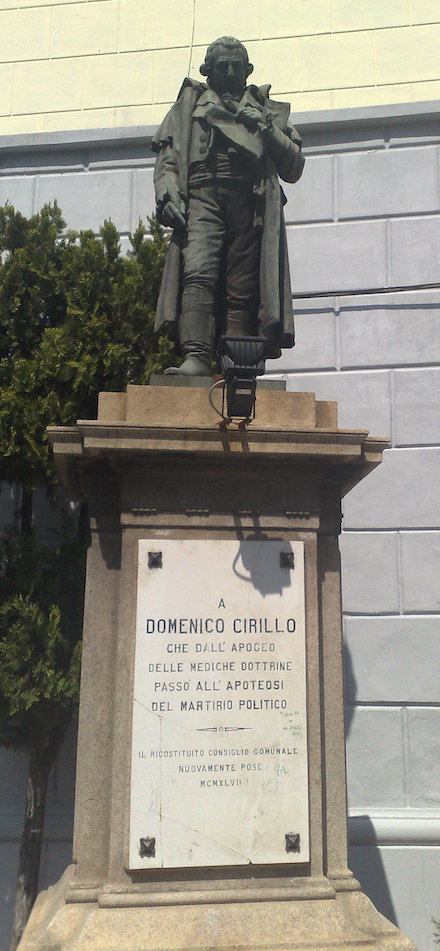Neapolitan physician and scientist Domenico Cirillo was hanged on this date in 1799, for joining the abortive Parthenopean Republic.

Statue of Cirillo at his hometown of Grumo Nevano, where a school and library also bear his name. (cc) image by Nicpac.
Cirillo (English Wikipedia entry | Italian) was a gifted botanist and entomologist with a raft of scholarly papers to his name; he introduced smallpox inoculation in Naples.
For a time he was also the personal physician to the royal family, but as a Jacbobin-curious Freemason he also partook of the era’s emerging egalitarianism. An urban myth-sounding anecdote holds that when a faced with competing calls for his attentions he preferred to first visit a poor man rather than a rich man who would pay him, saying “the art of healing must be practiced to relieve human misery and not to procure health.”
Despite all that he was only a tardy participant when Naples made its abortive Republican turn in 1799, only reluctantly acceding to urgings to join the Parthenopean Republic.
Perhaps he anticipated the fury of the counterrevolution — or, as he represented matters later, that his cooperation was no more than apolitical civic engagement. In an appeal that he had the weakness to dispatch to Lady Hamilton, the lover of Lord Nelson who was even then anchored in harbor applying British intervention against the Jacobins,
The conduct of my life, before and after the French Revolution, was always honest, pure and loyal. I was often called to care for the French, who were sick, but I never had any intimacy with them, I had correspondence with them of any kind … For three months, I did nothing but help with my own money and that of some charitable friends the large number of [poor people] existing in the city. I induced all the doctors, surgeons and associations to go around visiting the impoverished, who had no way to cure their ailments. After this period, Abrial came to establish the new government, and insisted that I accept a seat on the Legislative Commission. I refused two or three times: in the end I was threatened and forced. What could I do? However, in the short time of this administration, I never took an oath against the king, I never wrote or spoke a single word offensive against any of the Royal Family, nor appeared in their public ceremonies, nor donned their uniform. I didn’t handle public money, and the only paper ducats they gave me were distributed to the poor …
Your Ladyship now knows the true story, not of my crimes, but of the involuntary errors to which I was driven by the strength of the French army. Now, m’lady, in the name of God, don’t abandon your unfortunate friend. Remember that by saving my life you will have the eternal gratitude of an honest family. Your generosity, that of your husband and the great Nelson are my only hopes. Obtain for me a pardon from our merciful king, and the public will benefit by my medical observations, collected in the space of forty years. Remember that I did all I could to save the Botanical Garden of Caserta, and I did my best to be of the best use to Mrs. Greffer’s [a widow whom Lord Nelson had aided -ed.] children. (Source)
No sale for Lord Nelson, who did indeed have the practical power to make decisive intercession, but refused.
Domenico Cirillo, who had been the King’s physician, might have been saved, but that he chose to play the fool and lie, denying that he had ever made any speeches against the government, and saying that he only took care of the poor in the hospitals.
On this day..
- 1890: Tom Woolfolk, "Bloody Wolfolk" - 2019
- 1965: Eighteen prison rioters from Pulau Senang - 2018
- 1915: Mrs. Chippy, safe return doubtful - 2017
- 1543: Pietro Fatinelli, betrayed by Lando - 2016
- 1936: Ramiro Ledesma Ramos, Falangist - 2015
- 1792: Three of the H.M.S. Bounty mutineers - 2014
- 1927: Baldomero Rodrigues, and then Baldomero Rodrigues again - 2013
- 1812: Claude-Francois de Malet and his conspirators - 2012
- 1935: Del Fontaine, punch drunk boxer - 2011
- 1268: Conradin of Swabia - 2010
- 1901: Leon Czolgosz, William McKinley's assassin - 2009
- 1618: Walter Raleigh, age of exploration adventurer - 2008

















